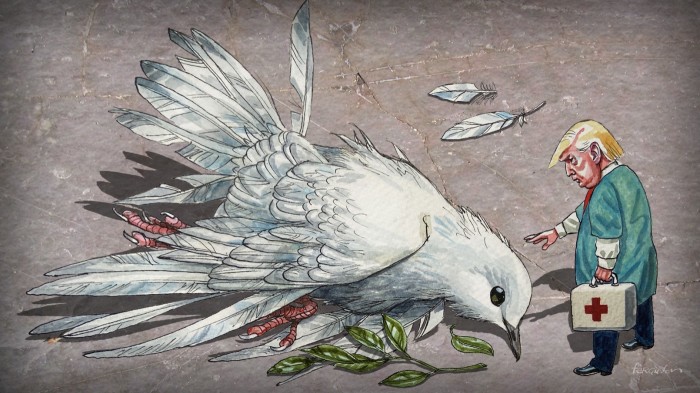Unlock the White House Watch newsletter for free
Your guide to what Trump’s second term means for Washington, business and the world
Resigning from the job of world policeman is harder than it seems. When fighting broke out between India and Pakistan last week, the first reactions of the leading figures in the Trump administration were in line with “America First” principles.
JD Vance said the US was not going to get involved in a conflict that was “fundamentally none of our business”. The US vice-president continued: “We can’t control these countries . . . America can’t tell the Indians to lay down their arms. We can’t tell the Pakistanis to lay down their arms.” President Donald Trump commented vaguely that the two countries would “get it figured out one way or the other”.
That lofty indifference did not survive long. As the fighting between India and Pakistan intensified — with Pakistan dropping heavy hints about nuclear weapons — top US officials, including Vance, hit the phones. When a ceasefire was announced, Trump was quick to claim the credit. (No surprise there.)
The exact role of the US in negotiating a ceasefire — and whether it will hold — remain open questions. But the whole episode is reminiscent of a famous phrase of Madeleine Albright: America is the “indispensable nation”.
Albright, who served as secretary of state under Bill Clinton, is exactly the sort of liberal internationalist “globalist” despised by the “America First” crowd that has gathered around Trump.
There is an argument that it is not just ironic — but also somehow inevitable — that Trump and Vance have ended up in the place that Albright marked out for them. They are running a superpower and, as the foreign policy thinker Robert Kagan once put it: “Superpowers don’t get to retire.”
It is possible that if Trump and Vance had stuck with their initial instincts and stayed aloof from the India-Pakistan conflict, the US would have not suffered any untoward consequences. But, in the end, they were not prepared to risk it.
Whether Trump and co genuinely aspire to “retire” — or just to use American power in different ways — is also unclear. At times they talk about washing their hands of vexatious foreign disputes. At other moments it is all about promoting US economic interests.
The self-styled “restrainers” who have gathered around Vance, in particular, genuinely regard themselves as peacemakers — despite the administration’s threats to Greenland and Panama. As for Trump himself, his self-image as the master dealmaker extends not just to trade — but also to war and peace.
Last week the president finally got the chance to claim credit for trade and peace deals. Britain and the US signed a truce in the trade war that Trump himself had initiated. And Pakistan and India halted their deadly exchanges.
In diplomacy — as in trade — the next question is whether last week’s deals will prove to be one-offs. Or whether Trump can finally make good on his claims to be a master dealmaker.
Until now — beneath the hoopla and the self-promotion — the Trump administration has made very little progress in its search for peace deals. The Gaza ceasefire that the US negotiated back in January has broken down. The Israeli government apparently feels it has carte blanche to fight the war as it sees fit, including preventing the supply of food and humanitarian relief into Gaza.
Trump may use his visit to the Middle East this week to try and revive some kind of peace plan for Gaza. But the chances of success seem slim — even as the situation on the ground gets more and more desperate.
In the Gulf, Trump will also have to engage with the question of Iran. Israel is pushing hard for a military strike against the Iranian nuclear programme, even as Washington attempts to negotiate a new nuclear deal with Tehran. The question of whether to greenlight an Israeli attack — that would almost inevitably pull in the US — is emerging as the central foreign policy division within the Trump administration.
Here the restrainers, led by Vance, seem to be gaining the upper hand in arguing against military action. The dismissal of Mike Waltz, the hawkish US national security adviser, was a blow to the Netanyahu government. But the idea of attacking Iran keeps coming back. One prominent restrainer says: “I call Monday, ‘stop war with Iran day’, because that’s how every week starts.”
And then there are the efforts to negotiate a ceasefire between Russia and Ukraine. Once again, the Trump administration has found the realities of diplomacy frustrating. In Washington last week, I saw Vance complain that the Ukrainians and Russians both spent the first half hour of any conversation rehashing their grievances against each other.
Trump’s go-to negotiator is Steve Witkoff, a real estate mogul, who is simultaneously charged with ending the Russia-Ukraine war, dealing with the Iranian nuclear programme and bringing peace to Gaza. If he has a spare five minutes, he might also be asked to solve Kashmir.
If the Trump administration’s foreign policy in-tray was not full enough, some close observers also fear that China is preparing to make a move on Taiwan.
Faced with all these frustrating foreigners, there is a clear temptation for Trump to ignore the outside world and to rely on the “big beautiful ocean” to keep America safe. But — as last week’s events in south Asia proved — that is easier said than done.
Read the full article here




